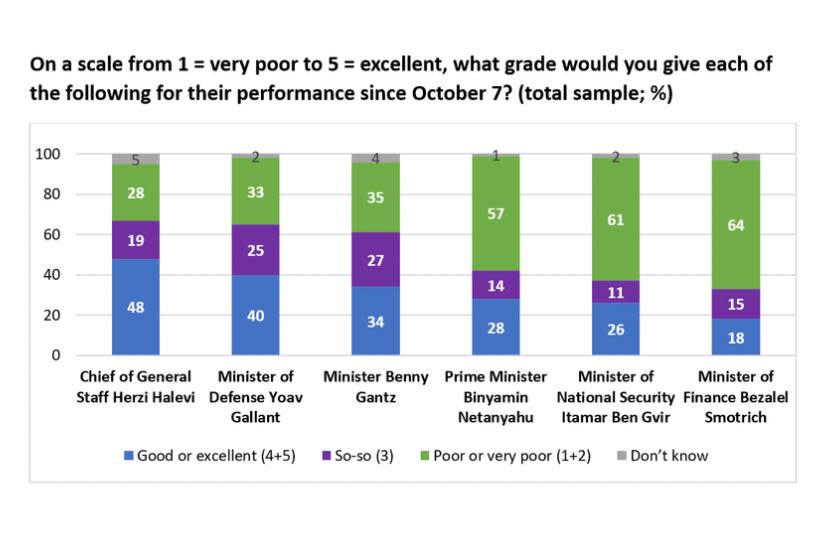According to a new survey published by the Israeli Democracy Institute (IDI) on Tuesday, IDF Chief of Staff Herzi Halevi holds the highest rating among Israeli officials regarding positive performance in the eyes of the Israeli public amid the ongoing war.
In the survey, Halevi topped the rankings with an approval rating of 48%, with Defense Minister Yoav Gallant following in second place with an approval rating of 40%.
Minister-without-portfolio Benny Gantz ranked in the middle of the pack with 34%, still polling higher than Prime Minister Benjamin Netanyahu, who only received 28% of public approval for his performance.
This was a slight improvement since November, when Netanyahu received only 26.5%. However, 57% of respondents ranked the prime minister as “poor” or “very poor.”
The survey stated that Halevi maintained his lead in ranking across the political left, center, and right. Finance Minister Bezalel Smotrich also received a consistent ranking along the political spectrum, ranking last in all three.

The survey was published amid multiple political controversies within Israel, such as the haredi (ultra-Orthodox) draft bill, stalled hostage deal talks in Qatar, and the Knesset’s recess.
This survey is the 13th in a series conducted by the Viterbi Family Center for Public Opinion and Policy Research of the IDI, which has been assessing the performance of various Israeli officials since the outbreak of the war on October 7.
Israelis share their sentiment on other issues
The survey also asked respondents about many issues, including coordination with the US, the likelihood of war with Hezbollah, and the suffering of the Palestinians.
US-Israel relations have been shaken up following the US abstention from the UNSC resolution vote that called for an immediate ceasefire in Gaza and Netanyahu recalling the Israeli delegations that were headed to Washington.
Respondents were asked whether Israel should coordinate with the US or act only according to the judgment of its leaders. Jewish respondents said that Israeli leadership judgment should take precedence. However, the number of respondents who favored coordination with the US grew to 43% from 38% in January. Also, Arab Israeli respondents favored coordination with the US much more, with 63% of them answering favorably.
